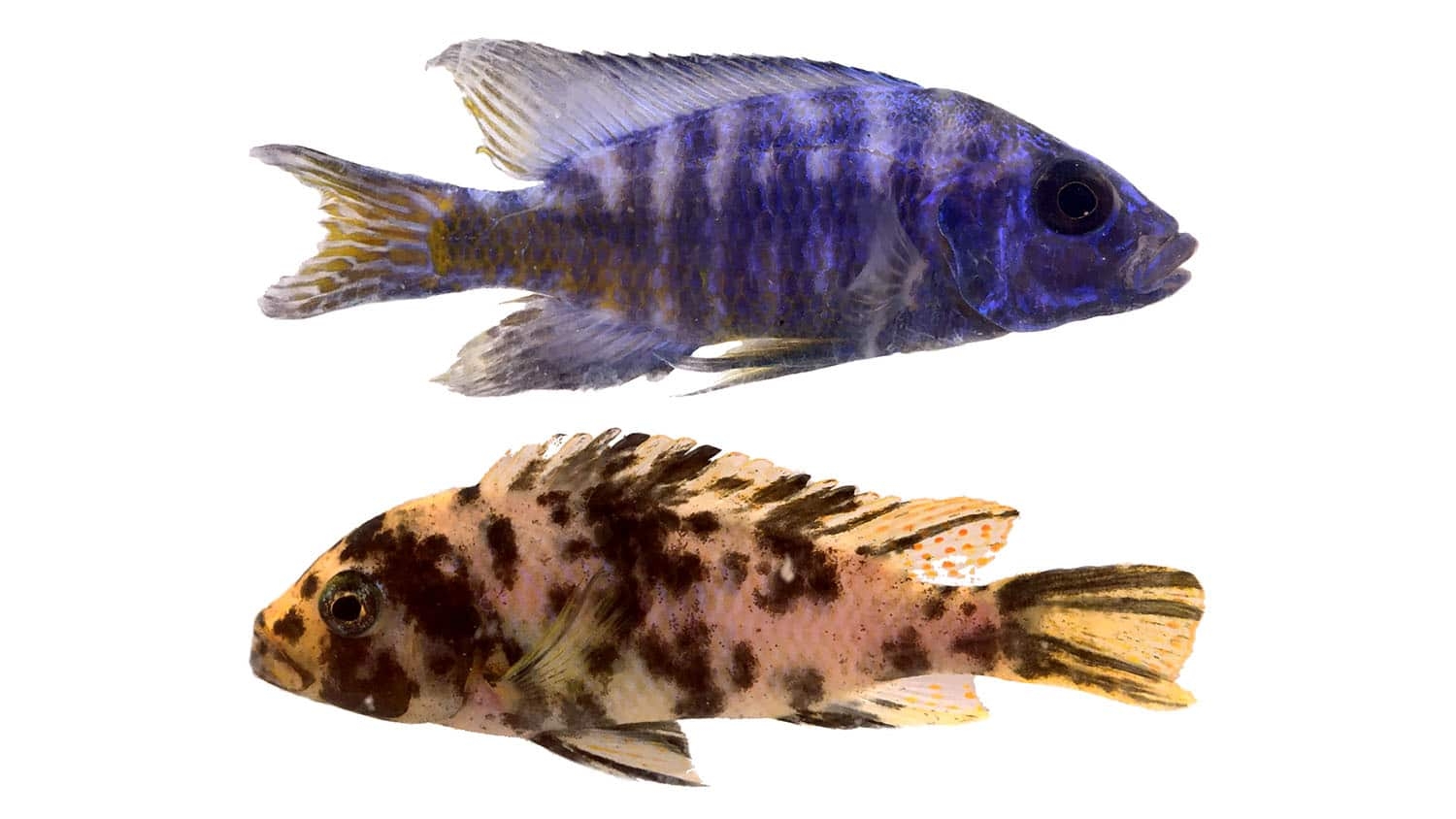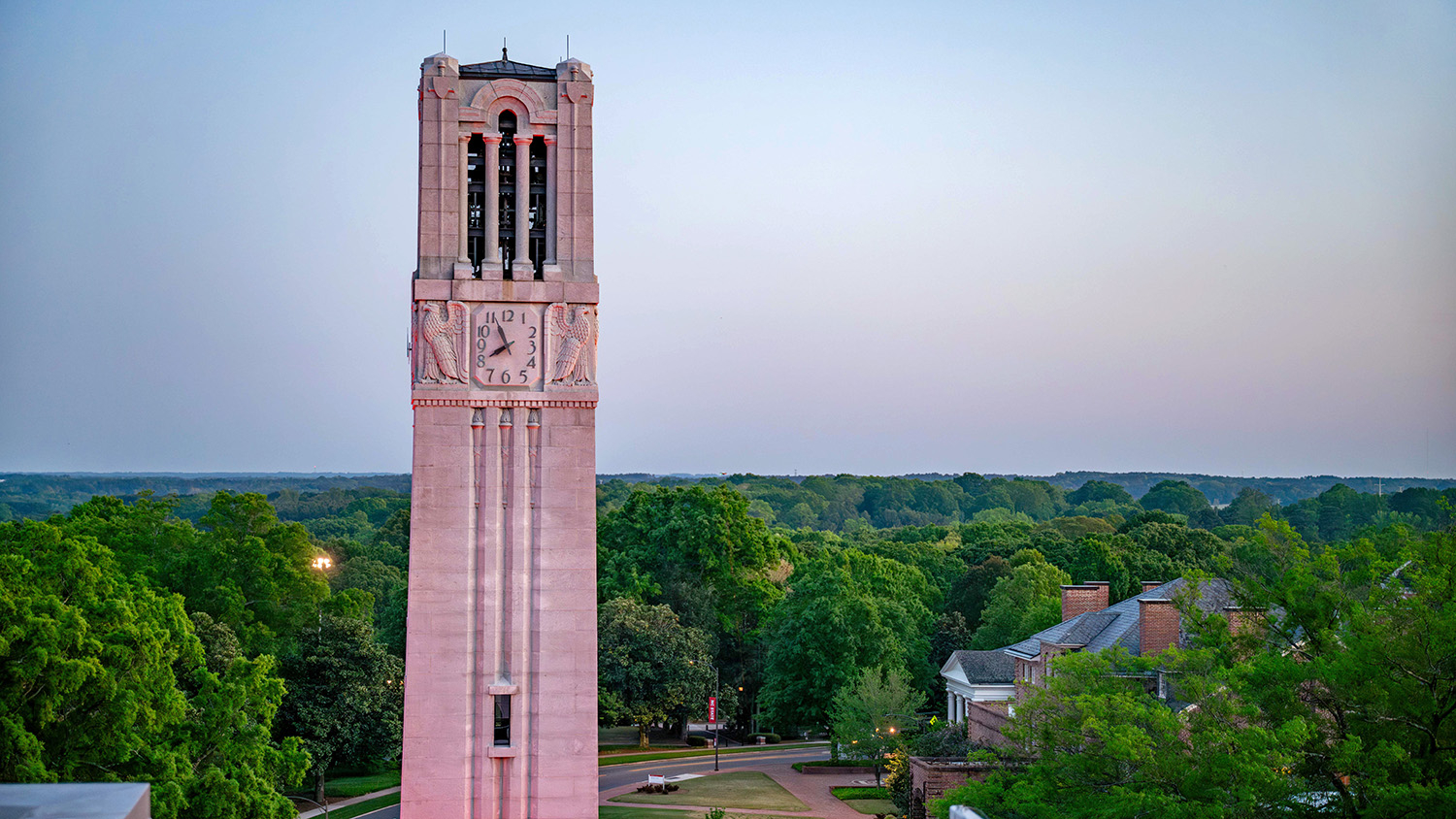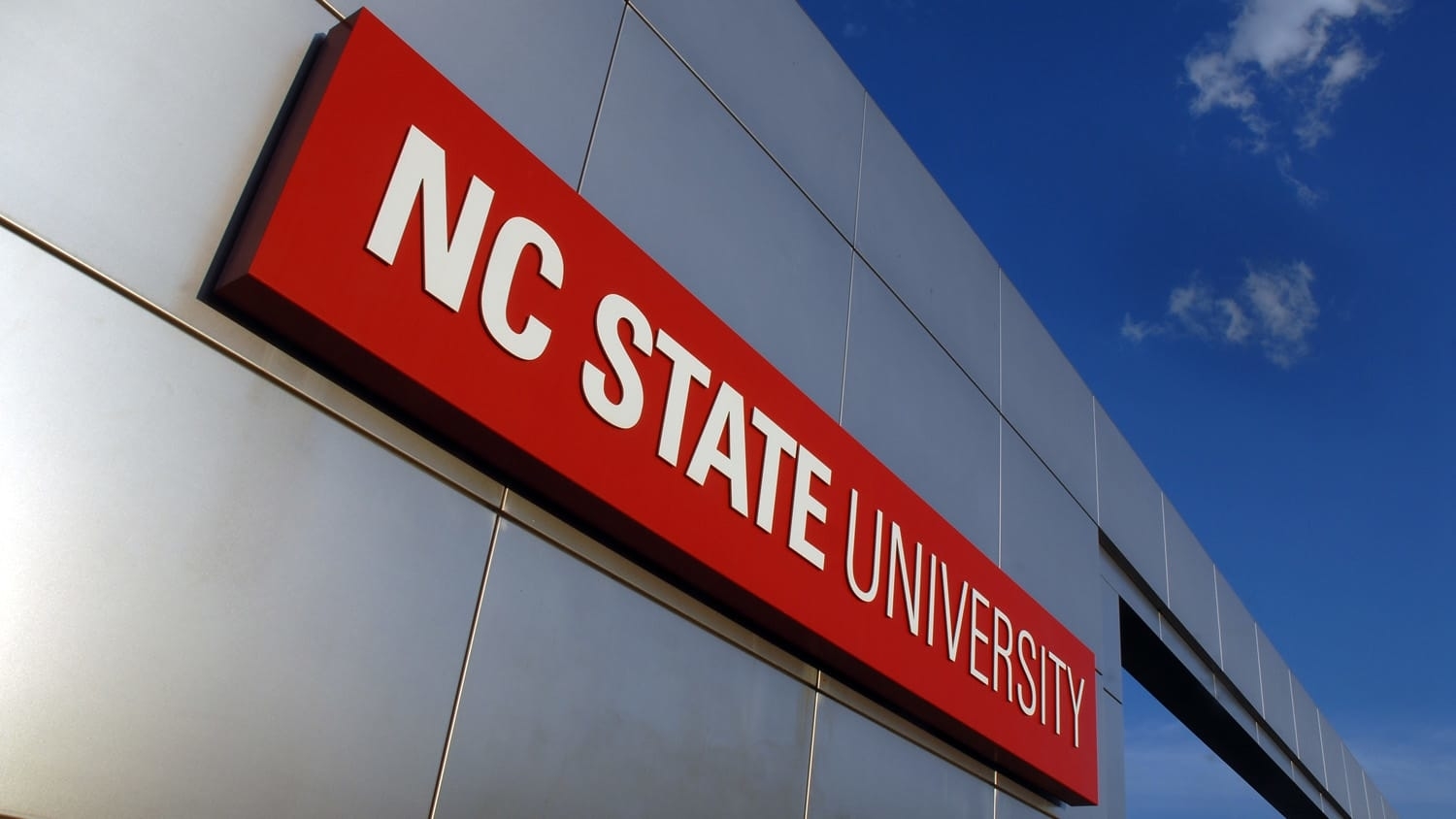Stepping Up to Serve
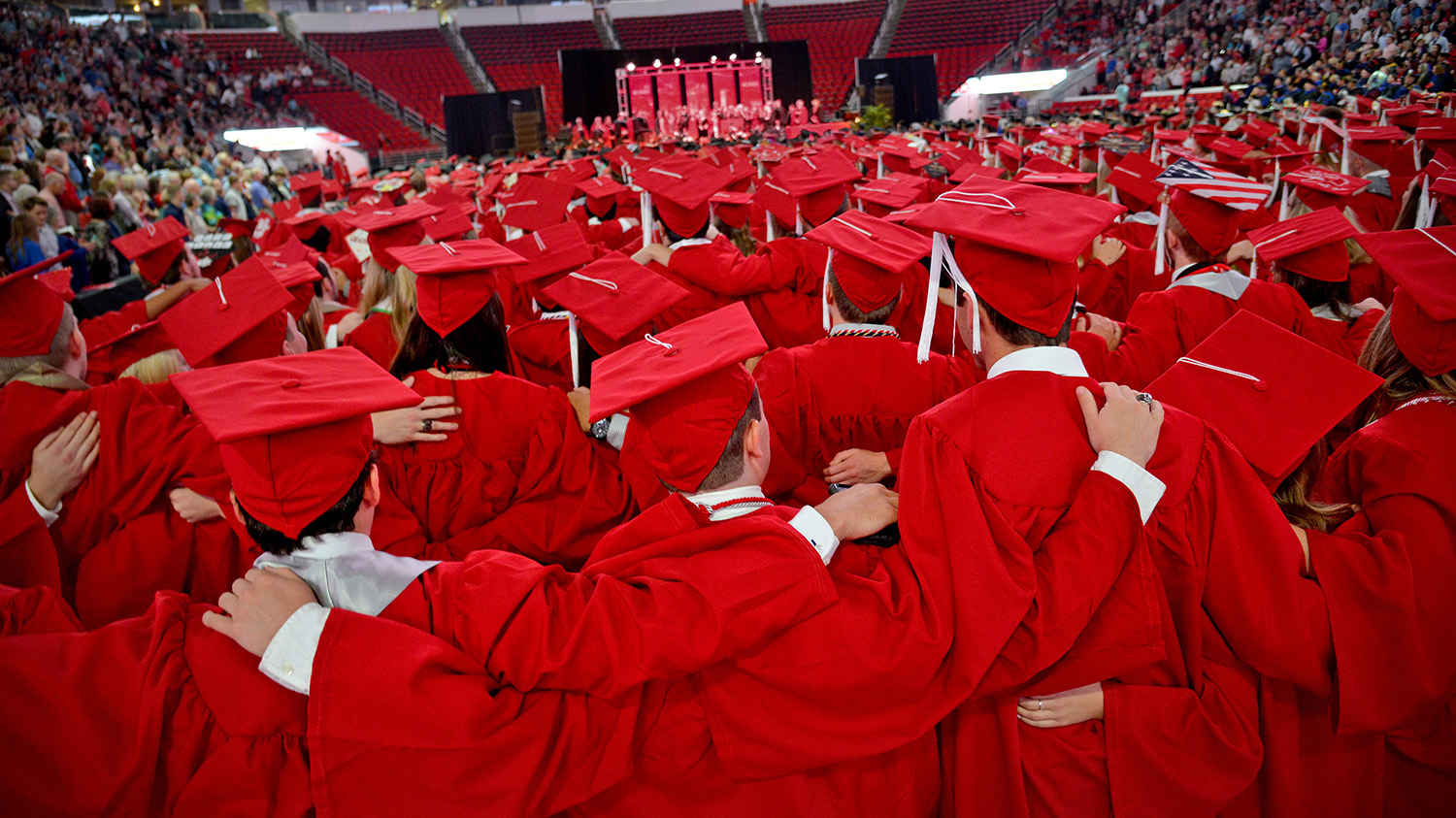
Thousands of NC State students recently became members of an alumni family stretching around the world. They’re entering this family in the most unexpected of manners — launched into a new phase of life amongst the challenges of the COVID-19 pandemic. NC State graduates, with their Think and Do spirits, will turn those challenges into opportunities for growth.
The Class of 2020 includes many members who will pursue further education or careers in service-related fields where they are needed now more than ever. We spoke to some of those graduates about an unexpected finale to their NC State journey, and how the university prepared them for this moment.
Caroline Alexander
Bachelor of Science in Science Education
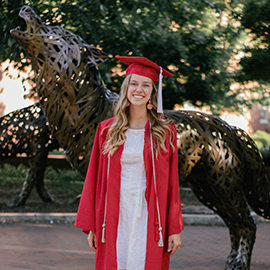 Caroline Alexander chose NC State for its renowned engineering program. The Concord, NC, native, found out her passions were more aligned with teaching, though, after working with middle and high school youth during a summer camp. She changed majors during her sophomore year and soon became a North Carolina Teaching Fellow. Now she gets to combine two things she loves and teach her future students chemistry.
Caroline Alexander chose NC State for its renowned engineering program. The Concord, NC, native, found out her passions were more aligned with teaching, though, after working with middle and high school youth during a summer camp. She changed majors during her sophomore year and soon became a North Carolina Teaching Fellow. Now she gets to combine two things she loves and teach her future students chemistry.
Through the N.C. Teaching Fellows Program, she found the freedom to spend more time focusing on classes, extracurricular activities and professional development. She also gained valuable experience through her student teaching placement, which she started at the beginning of the spring semester.
“COVID-19 came in the middle of my student teaching. When I left school in March, I didn’t realize it was the last time I would be walking out those doors,” she said. “I don’t think anyone could have anticipated a total shift to online education in the middle of the school year. I felt slighted because I didn’t get to say goodbye to my students.”
Technology gave her the opportunity to stay in touch with her students through what was undoubtedly a tough time for them as well. In spite of some difficulties presented by COVID-19, Alexander will experience some positives on the road ahead. She’ll marry a fellow Wolfpacker this summer and will apply for chemistry teaching positions once they settle on a place to live.
She’s excited about getting into the classroom, where she foresees many changes due to COVID-19.
“I’m trying to mentally prepare myself that I might be starting my first year of teaching online,” said Alexander. “It’ll certainly be a different experience than being in the classroom with students, but teachers are resilient. We will continue to find ways to adapt and overcome to meet the needs of our students as new challenges arise .”
NC State’s College of Education equipped her to give her students an engaging classroom (virtual or in-person) experience. During her time on campus, a variety of science and methods courses and field experiences helped Alexander develop into a strong teacher. Now, she has the content knowledge and pedagogical skills to help others learn.
“My advice for anyone considering going into education would be to home in on your “why” — you may face challenges, but if you hold tight to your reason, it’ll be easy to persist,” she said. “Through challenging courses and tough moments, I kept going because I knew that every exam, every obstacle was preparing me to be the teacher my future students need!”
Regardless of the difficulties presented by COVID-19, another NC State graduate is positioned to go into a world that truly needs her.
Devin Byrne
Bachelor of Arts in Technology, Engineering and Design Education
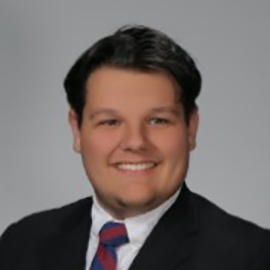 Family proximity and financial aid brought Devin Byrne to NC State, but the community kept him here. Like Alexander, the Long Island, NY, native is part of NC State’s first graduating class of N.C. Teaching Fellows since the program was reinstated. A visit to Raleigh sealed his certainty about the university.
Family proximity and financial aid brought Devin Byrne to NC State, but the community kept him here. Like Alexander, the Long Island, NY, native is part of NC State’s first graduating class of N.C. Teaching Fellows since the program was reinstated. A visit to Raleigh sealed his certainty about the university.
“As soon as I stepped out of the car, I realized that Raleigh was where I was meant to be, regardless of the money and distance,” said Byrne. “If I had to go back and do it all over again I would make the same decision.”
The people of NC State also played a major role in cementing his positive experience. This includes Crystal Epsey, coordinator of the N.C. Teaching Fellows Program at NC State.
“Having Crystal as a mentor and advisor is invaluable,” said Byrne. “She’s done so much for the program and for me and the other teaching fellows that I can’t even begin to express her importance. She’s been able to craft experiences that you won’t find anywhere else.”
Those experiences helped equip Byrne for dealing with a semester interrupted by COVID-19 and prepared him to go into a world that needs even more excellent teachers. His social experience and interaction with classmates was severely limited, but his future plans remain the same. Byrne will be working at American Tower as an engineering designer.
Of course, Byrne knows the impact COVID-19 will make on education in the future. Until technology and internet access are equitable, there’s no way to fully delve into a virtual classroom.
“I think through all of this education will become more flexible,” said Byrne. “More emphasis on technological literacy will be placed into instruction, and it will be intertwined with education more than it is already. A huge change is coming, and I think we should welcome it with open arms.”
As an NC State graduate, Byrne is ready for the future. The university provided him with opportunities to work with programs and people who taught both life and leadership skills. Faculty and staff offered opportunities for professional development and real-world experience through internships and field placements through one of the country’s top education programs. Fellow students also helped form a support system that will remain in place as Byrne takes his next steps.
He knows his fellow graduates will also be entering a field that often requires long hours. But he knows the hours he will put in come from a sense of purpose.
“Those long days and long nights are worth it because you’re giving a kid a chance. You’re providing them with support that you can never even imagine, you’re making an impact on their life, one they’ll never forget. It’s so worth it. So dive head first and be the crazy person that decides to make a difference,” he said. “I definitely feel that I’ve come out more prepared than I could have ever imagined coming into NC State.”
Jackie Lanning
Bachelor of Arts in Biological Sciences with a concentration in Public Health, International Studies Minor
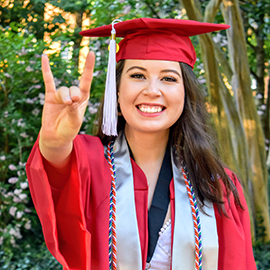 Coming from a small high school in Graham, NC, Jackie Lanning was excited about the challenge of adapting to a large university with a multitude of resources and opportunities to make connections. She chose her major in order to better understand the human condition and improve public health.
Coming from a small high school in Graham, NC, Jackie Lanning was excited about the challenge of adapting to a large university with a multitude of resources and opportunities to make connections. She chose her major in order to better understand the human condition and improve public health.
The College of Sciences helped her learn more about how social determinants like a person’s gender, race, income and home address affect their health. She also gained a holistic perspective on health by taking courses in statistics, psychology, sociology and gender studies.
Through classes and extracurriculars, Lanning certainly made the most of her time at NC State. She served as president of Period at NC State, vice president of Planned Parenthood Generation Action, was a residential advisor, peer mentor in The Movement at the Women’s Center, Career Identity Guide, Alternative Service Break participant and leader, and Social Innovation Fellow. All of her activities were connected by a common theme — service.
Period at NC State, which Lanning founded during her sophomore year, is a student organization that provides menstrual care packages to underserved populations in Wake County through partnerships with various organizations including InterAct, Women’s Center of Wake County, Wake County Public Schools, Urban Ministries and Feed the Pack Pantry. In two years, the organization distributed more than 2,500 period care packages and started conversations on campus about menstrual equity.
“It is difficult for me to see my passions as separate from my work,” said Lanning. “I took part in research and activism as a way to put my passion for ending health disparities into action. Through my activism, I found a special passion for sexual and reproductive health and their intersection with gender inequalities. By getting involved in research that aligned with my passions, I found role models who inspired me to continue in science and research.”
The Provost’s Professional Experience Program facilitated her research experience in Laura Widman’s Teen Health Lab. As a research assistant, she traveled to high schools throughout North Carolina to help deliver a digital sexual health intervention for adolescents.
“As much time Dr. Widman and her graduate research assistants spent delivering the intervention, they had spent even more time building trusting relationships with the schools’ staff,” said Lanning. “They showed me how to demonstrate respect, appreciation and empathy towards the communities you study.”
She took that experience and conducted an independent community-based research project as a WomenNC Scholar on disparities in maternal and child health in Durham. Through the connections of Chancellor’s Faculty Excellence Program member Cathrine Hoyo, Lanning worked with a local nonprofit to survey residents, learn more about their community and share her results with them.
Lanning’s research paved the way for her to attend Emory University Rollins School of Public Health this fall as a Merit Scholar to pursue a master of public health in epidemiology.
“This is a revolutionary time to learn from top public health experts. I am interested to see how COVID-19 transforms the public health field and its influence on adjacent issues like the prevalence of interpersonal violence and racial disparities in health,” said Lanning. “COVID-19 has not changed my plans, but rather strengthened them. Seeing how this virus has affected so many communities, I am more motivated to continue my work in public health. I think the COVID-19 pandemic has exposed the systems of health inequities that disproportionately affect black and brown communities, women, and low-income populations. I hope that in the aftermath of the pandemic more will be done to achieve health equity.”
While Lanning will continue her journey in Georgia, NC State helped launch her studies by giving her the opportunity to develop interests into passions. The university acted as a safe zone to take risks, and the people helped change the way she views obstacles and opportunities. She particularly notes that the wealth of resources and people willing to help her with ideas have prepared her to take bigger steps in the future.
“Through my activism with student organizations and research experience, I have met role models and mentors who have taught me how to serve others in the best way possible,” said Lanning. “To the Class of 2020: Remember everything you have overcome before this moment. Just like every detour, obstacle or surprise you have faced, ‘If it happens, you’ll handle it.’ I can’t promise that it will be easy or that you will not be upset by the process, but you will get through it.”
Taylor Odem
Bachelor of Science in Genetics
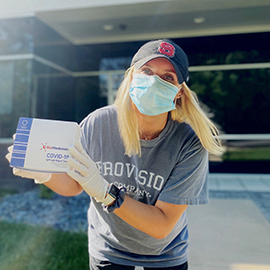 For many reasons, NC State is a one-of-a-kind university. It is the only North Carolina school offering a Bachelor of Science in genetics, which made NC State the right choice for Taylor Odem.
For many reasons, NC State is a one-of-a-kind university. It is the only North Carolina school offering a Bachelor of Science in genetics, which made NC State the right choice for Taylor Odem.
Odem was raised a UNC fan in Dallas, NC. For months after receiving college acceptance letters, she debated on which school to attend. She toured NC State, learned more about the genetics program and fell in love with everything the school had to offer.
“I knew entering college that I wanted to pursue a master’s in genetic counseling after my undergraduate studies, so I felt that majoring in genetics would best prepare me for that path,” said Odem. “I 100% made the right choice with NC State and am so thankful for everything that it has given me.”
The university also gave her the chance to enrich her studies through a variety of campus organizations. This includes Pack Peers, where she engaged with other students about health and wellness and helped make them aware of the resources that Student Health offers. She also volunteered at HopeLine, a crisis intervention and suicide prevention hotline available over the phone or via text.
Going into the semester, Odem made plans to continue with her volunteerism and classes as usual, like any senior would.
“Unfortunately, this is far from how I imagined my senior year ending. There were so many things that I did on and around campus that I didn’t realize would be the last time I was doing them,” said Odem on her year impacted by COVID-19. “In response to all of this, I have tried to be as positive as possible. I like to talk about all of the good things that happened during my time at NC State and all of the great things that are ahead.”
COVID-19 may have prevented a traditional senior year, but it also gave Odem the opportunity to Think and Do in new ways. This semester she interned with a local company helping prepare COVID-19 tests. She has been part of an innovative response at a time when tests are needed to determine infection rates and slow virus spread.
In August, Odem will be starting in the Master of Science in genetic counseling program at the University of North Carolina at Greensboro. She hopes that with the planned reopening of UNC System campuses, her studies will go forward uninterrupted. Looking back on a truly unique semester, she has gained a positive perspective.
“I know that this is not how we wanted our senior year to end, but I hope that we can all remember all the good that NC State gave us and take that out into the world as we go on,” she said. “Go Wolfpack!”
Blake Schwartz
Ph.D. in Operations Research
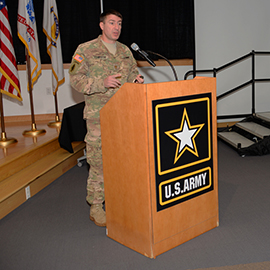 When Blake Schwartz came to NC State, he already had quite a few achievements to his name. Schwartz graduated from the United States Military Academy at West Point in 2003 and eventually became an operations research analyst with the U.S. Army, earning the rank of major.
When Blake Schwartz came to NC State, he already had quite a few achievements to his name. Schwartz graduated from the United States Military Academy at West Point in 2003 and eventually became an operations research analyst with the U.S. Army, earning the rank of major.
He arrived at NC State in 2011 to pursue a Master of Science in operations research and graduated in 2013. Schwartz already knew NC State and the Graduate School’s excellent academic reputation, and he felt that the doctoral program in engineering was the right fit for reaching his goals.
“The faculty is extremely accessible and easy to work with, and I found the quality of instruction to be very high,” said Schwartz. “Additionally, as an active duty member of the military, I knew that NC State has a history of military graduate students and an outstanding support network.”
Schwartz wanted to conduct doctoral research applicable to the Army, in order to improve military operations. He used network modeling and simulation techniques to formulate a better way to plan and execute military logistics networks, which he hopes will be used by the military in the future.
For his work, Schwartz was awarded the 2018 Army Operations Research Symposium Best Paper for his research modeling logistics networks to support military operations. His research will help support the Military Logistics Network Planning System, which provides automated assistance for military planners, and could be particularly applicable in humanitarian and disaster-relief efforts.
The U.S. Military Academy funded his doctoral studies, and it’s where he’ll return this summer, teaching in the Department of Mathematical Sciences for his next assignment. His time at NC State prepared him to build a future career through the contacts he made with faculty and students, along with being able to present his research and publish articles.
His prior military experience also helped him build a unique perspective of the COVID-19 pandemic.
“If no one’s shooting at you, there’s no reason to panic, and you’ll find that panic never helps anyway,” said Schwartz. “The Army also teaches cooperation and teamwork in dealing with difficult situations, something that’s very applicable today.”
For his fellow graduates in the Class of 2020, Schwartz emphasizes formulating goals and having a plan to achieve them, while embracing flexibility.
“Your plan will have to change, and things won’t always go your way, but if you keep working toward your goals, you can get there,” he said.
This post was originally published in Provost's Office News.
